App developed by Mount Sinai helps save woman’s life

Dr. Annapoorna Kini, Director of the Cardiac Catheterization Lab at Mount Sinai Hospital, performed the life-saving procedure on Natashia Belletty and designed the STEMIcathAID app.
Evan Triantafilidis
evant@queensledger.com
An app designed by healthcare professionals at Mount Sinai to expedite and streamline care for heart attack patients has proved to be life-saving technology for a Queens woman.
Long Island City resident Natashia Belletty says her traumatic experience began last October when she was hit by a car in the chest. Belletty took multiple trips to other hospitals with severe chest pain within the following month, and days after being sent home with just tylenol, she collapsed in the middle of the night.
“I felt like an elephant was sitting on my chest,” Belletty, 53, said. “I was dying.”
Belletty was taken via ambulance from her fifth-floor apartment to Mount Sinai Queens Emergency Department, where physicians said she was suffering from a ST-segment elevation myocardial infarction (STEMI) heart attack, the most severe of its kind.
Belletty was rushed to the cath lab at Mount Sinai Hospital on the Upper East Side to undergo an urgent stenting procedure. Waiting for Belletty on the other side of the six-mile transfer between sister hospitals was Dr. Annapoorna Kini, Director of the Cardiac Catheterization Lab at Mount Sinai Hospital.
With the help of the app that Dr. Kini designed, a communication platform is put in place to better communicate with doctors, nurses, and the clinical command center throughout the entire process. Once Dr. Kini examines a patients’ EKG and determines if they are appropriate for an emergency procedure, a push of a button can alert a team to be ready to accept the patient and prepare for the procedure.
The app, called “STEMIcathAID,” launched last July and helps the nearly 150 patients transferred every year from the Mount Sinai Queens Emergency Department to the Mount Sinai Hospital’s cath lab. All cardiac team members log-in and begin communicating via a HIPAA-compliant chat or video call. The cath lab team can track the progress of the ambulance through the app while preparing the room and equipment for the emergency procedure.
In Belletty’s case, Dr. Kini performed the life-saving procedure after she suffered a STEMI heart attack.
“She had a blockage in the artery, which we had to open,” Dr. Kini said.
Dr. Kini adds that medical teams are up against the clock with patients suffering heart attacks, as procedures occur less than 90 minutes after patients are first presented to health professionals.
“Everyone gets an alert and then we know what we have to do,”Dr. Kini continued . “Things move fast.”
Belletty, the fully-vaccinated grandmother of two, received a follow-up operation on her heart in January. The second procedure was initially delayed because she tested positive for COVID-19.
Today, she says she feels much better thanks to the help of Dr. Kini and Mount Sinai Hospital.
“They’ve done a remarkable job for me,” Belletty said . “They took good care of me and now I look forward to seeing Dr. Kini.”
With a new outlook on life, Belletty has cut out fast food entirely from her diet. Her heart health, she says, is imperative, especially with family history of heart issues.
“I hardly eat any meat anymore,” says Belletty. “There’s no more soda, only water. Maybe some fish, and a lot of vegetables. I feel like I’m going vegan.”
Dr. Kini says maintaining a healthy lifestyle can help extend the lives for patients like Belletty.
“A lot of it is genetics, but 50 percent also depends on your lifestyle,” Dr. Kini said. “Everybody has genetics that nobody can change, but you can change the lifestyle that is in your hands.”
Dr. Kini also recommends patients cut down on saturated fats and sugary drinks, and to substitute them for more vegetables.
“I hope to live for the rest of my life,” said Belletty.

Natashia Belletty in her hospital bed surrounded by physicians at Mount Sinai Hospital.


